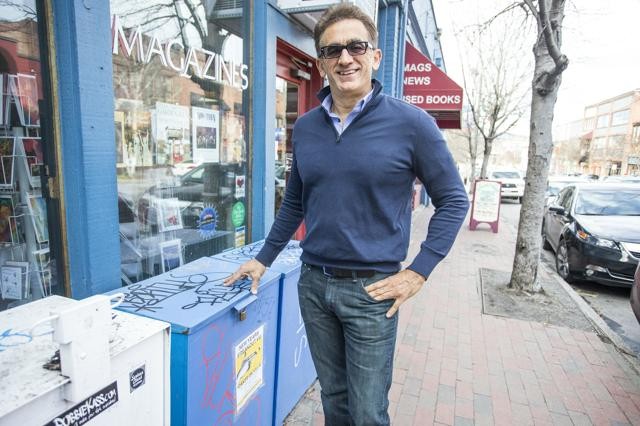- Disappearances: Anoop Krishnan, owner of Mela restaurant, says he saw people in a city truck remove boxes from Lexington Avenue. Photo by Alicia Funderburk
- What’s in the box: Newspaper boxes for a variety of small, local publications went missing around Nov. 19 and 20. They were found in an abandoned parking garage Dec. 9. How they got there remains a mystery. Photo by Jeff Tallman
- ‘A civic treasure’: Beth Grace, head of the North Carolina Press Association, asserts that Asheville’s array of local papers is a “civic treasure” that shouldn’t be curbed because of concerns about beautification. Photo courtesy of North Carolina Press Association
A series of emails obtained by Xpress shed new light on a continuing dispute over lost, found, reviled and defended newspaper boxes downtown. The emails, written during the weeks before and after the boxes’ mysterious disappearance, reveal a vigorous behind-the-scenes discussion between city staff and Downtown Commission members concerning the boxes’ place in public life — and whether the city could legally remove them. The discussion also highlights an ongoing tug of war between downtown advocates and First Amendment protections.
Dozens of boxes for distributing a bevy of publications — including The Laurel of Asheville, The Urban News and a promotional pamphlet for Shoji Retreats — suddenly disappeared around Nov. 19, and someone cleaned up the adjacent space. Then, on Dec. 9, city parking attendants discovered some of them in an abandoned, city-owned parking garage on Haywood Street. Neither Mountain Xpress nor the Asheville Citizen-Times had boxes removed.
Anoop Krishnan, who owns Mela restaurant on Lexington Avenue, says he saw people with a city of Asheville truck remove some of them, but city staff deny any involvement, and an internal inquiry found no evidence of it.
In the age of electronic media, some might see newspaper boxes as an anachronism whose disappearance would scarcely matter to anyone except mystery aficionados and the dozen or so affected publications. But Beth Grace, executive director of the North Carolina Press Association, says eliminating the boxes in the name of beautification restricts the public dialogue that’s essential to a healthy civic life. “Without those boxes, people can’t get their papers,” she points out. “People want the place where they live to be beautiful, but I think people also have the right to know, and to have those boxes in a convenient location. To take that away for aesthetics seems frivolous and shortsighted.”
Even today, Grace maintains, newspaper boxes play an essential role in informing the public, especially in a connected, walkable area like downtown Asheville.
To some downtown merchants, however, those boxes are merely an unsightly nuisance that hurts local businesses and detracts from downtown’s image.
“You want a sandwich board, a sidewalk café, you want to paint your sidewalk — you have to get an encroachment. Why aren’t we holding newspaper boxes to the same standard that we hold our downtown merchants?” Asheville Downtown Association President Adrian Vassallo asked at the Dec. 13 Downtown Commission meeting. “If City Council truly wants a partnership with downtown, this is something they need to address.”
Behind the scenes
Beginning in October, dozens of back-and-forth emails discussed whether newspaper boxes are still appropriate on the streets of Asheville — and whether those considered unsightly could simply be removed.
On Oct. 7, Vassallo, who also serves on the Downtown Commission, complained to city staff that “There continues to be un-inhabited or un-utilized boxes all over. Many of these are tagged and are full of trash. I think it’s time to put a permit system in place.”
City planner Alan Glines agreed to add the item to the agenda for the commission’s November meeting, to give staff time to “review the current situation.”
That wasn’t the first time the issue had come up. In February of 2012, city staff met with local publishers and told them that due to aesthetic concerns, the city would begin regulating downtown newspaper boxes. But restricting the boxes’ placement has significant First Amendment implications, and in the end, the publishers and city staff merely agreed to informally keep one another informed about any problems.
Downtown Commission Vice Chair Michael McDonough says he’s satisfied with some of the voluntary changes local publishers, dubbing them “the good guys,” have made, adding, “We’re almost there.” And even the commission members, he reveals, don’t entirely agree about the best approach to dealing with newspaper boxes. For his part, McDonough says he doesn’t favor as strict a permitting regime as Vassallo advocated in the emails.
Meanwhile, city staff remained concerned about the lack of resources for enforcement and the “fine line” in dealing with First Amendment issues, noted Glines. Vassallo’s complaint triggered an Oct. 23 discussion among staff in which several people favored steering clear of a permitting process because of the money, time and “headache,” in Glines’ words, it would take to enforce such rules.
To remove or not to remove
The dialogue continued into November, as staff considered whether they could remove abandoned or damaged boxes, where they could be stored, and how publishers might be notified.
On Nov. 12, Vassallo submitted an official complaint through The Asheville App, a feedback program checked by various staffers. Development analyst Abigail Riley quickly replied that city staff did not have jurisdiction in the issue.
Planning Director Judy Daniel responded that the city was reviewing the matter and crafting a policy to address “abandoned/trashy” boxes. She also noted that advertising publications have some First Amendment protections as well, and that the city’s Legal Department had advised them “to be very careful in how this is addressed.” Vassallo replied that the newspaper publishers had failed to police themselves, adding, “There are still numerous areas of downtown where these boxes are clustered and are just plain unsightly.”
He then proposed that downtown business owners be allowed to decide whether boxes could be placed outside their premises.
On Nov. 13, McDonough singled out Shoji Retreats, which later saw 11 of the 12 boxes for its promotional pamphlets vanish from downtown streets. “I would think we could tape a notice to Soji [sic] bins, letting them know they are illegal, and have 30 days to remove or they will be impounded,” he wrote, asking whether boxes could be considered “abandoned” after a certain number of days and then removed.
A 1993 U.S. Supreme Court ruling, City of Cincinnati v. Discovery Network, Inc., found that advertising materials have similar rights to distribute in public space as newspapers do, and attorneys familiar with First Amendment cases confirmed this. Asked about his contention that Shoji’s boxes were illegal, McDonough replied, “We’ve asked the city attorney to advise us what we can or can’t say about that.”
Soon after the Nov. 8 Downtown Commission meeting, the boxes disappeared, and Sammy Cox — whose business, Grass Routes, distributes a number of local publications — called attention to the mystery on Nov. 21, noting that he’d refilled one of the missing boxes only days before. Xpress Distribution Manager Jeff Tallman then conducted a survey of downtown boxes and estimated that up to 50 had vanished.
After about 20 turned up Dec. 9, Krishnan contacted Xpress, saying he’d seen two people in a city of Asheville truck removing them late at night on Nov. 19 or 20. Krishnan said they’d told him that newspapers now had to pay to be on the streets.
Whodunit?
In an early December email, after some of the boxes had turned up, Glines called it “a real whodunit. … Someone was making a point on the need to do something with the newspaper box policy, and that the city needs to remove those structures. Geez!”
Meanwhile, Deputy Public Works Director David Foster wondered, in an email to city staff, if the Downtown Commission or the Downtown Association could have “undertaken a guerrilla project on their own. They seemed put off that we were relucant to address the issue.” At a December Downtown Commission meeting, Vassallo and the other members present denied knowing who’d removed the boxes. Dwight Butner speculated that it might have been a prank.
The same day, Marsha Stickford, the city’s Neighborhood/Volunteer Coordinator, opined, “I doubt that we will ever know who did it.”
After Xpress reported Krishnan’s comments, city staff investigated, and in a Dec. 20 email, spokesperson Dawa Hitch said:
“After learning of the encounter the Lexington Avenue business owner had with the people removing newspaper boxes, we went back again to all of the crews that could have been working during that time. We have been unable to find staff members that fit the description of the two people with whom the owner spoke. Furthermore, no evidence of staff involvement in the removal of newspaper boxes was revealed as we researched the new information.”
City spokesperson Brian Postelle later explained that all Public Works vehicles are kept behind a locked gate after 6 p.m. There is a night crew that works from 11 p.m. to 7 a.m., but city officials say no staff members fitting the description Krishnan gave were working at that time, and it’s highly unlikely a non-employee could gain access to a city vehicle.
Julian Vorus, the manager of Downtown Books and News, said he wasn’t aware of anyone removing boxes; other neighboring businesses did not respond to requests for comment.
McDonough, meanwhile, noted: “This is Asheville; all kind of funky things happen. Nothing really surprises me anymore.”
Beauty and the box
Grace of the N.C. Press Association stresses the continuing value of newspaper boxes. “It’s important for every paper, but especially the smaller, free-distribution papers,” she asserts. “You go downtown to buy something, and you step out and there’s your local paper. … It’s a civic treasure to have a local paper available anywhere, much less in the center of town.”
The Asheville Daily Planet was among the affected businesses, and Publisher John North said that to publications already operating on slim margins in a rapidly changing industry, the loss of a box can be a significant hit. “It comes right out of my pocket.”
Grace concurs, noting that for newspapers and other publications, “Boxes are an essential part of the distribution plan.” Like other business owners, she points out, those publishers also pay their bills — and their taxes.
Still, despite the mystery surrounding the boxes’ disappearance, Grace says she wasn’t surprised by the incident. “Every so often you get a city or town that decides it’s going to beautify,” she reports. “For some reason, they think that the people’s right to know is not pretty to look at, and they take away the boxes.”
Values in collision
Mike Tadych, an attorney who’s worked with the Press Association and other groups on numerous First Amendment cases, notes that the Raleigh-Durham Airport Authority incurred more than $900,000 in legal costs after a judge ruled that its attempt to ban newspaper boxes violated publishers’ rights.
“This is the modern-day version of the newspaper boys and newsstands of days gone by,” says Tadych. “As long as they’re not blocking the right of way, they have a right to be there.”
On Dec. 2, after news of the disappearance had broken, Vassallo once again emailed city staff calling for stiffer regulations.
“I think this lends further evidence to the idea that we need to legitimize where these boxes are placed,” he wrote. “The boxes allow trash to accumulate and are also targets for graffiti, plus many of the boxes are not even true publications.”
In a later interview, McDonough voiced a similar concern, saying, “I think each of us has an issue with … marketing fliers riding on the coattails of the press.”
Tadych, however, says there’s not much support in the law for requiring permits or letting businesses decide which papers get to use their stretch of sidewalk. “You can’t charge rent on the public square,” he explains. “Permitting could be seen as a tax on the First Amendment.”
Meanwhile, city staff continue to try to balance the conflicting concerns. In December, Glines asked members of NCPlan (a Listserv for planning professionals in the state) how to tackle the problem. The email responders urged backing off, due to the constitutional issues involved and the complexity of attempting to regulate the boxes.
As for any future city policy, Tadych notes that historically, the courts have had little sympathy for the aesthetic concerns that are central to the commission members’ complaints.
“Sometimes free speech isn’t pretty,” he observes. “Get over it.”
McDonough, however, believes the condition of some boxes raises genuine safety and sanitation concerns, and that other interests must be considered alongside those of newspapers.
“The public ground is for everyone to share; we want to make sure one set of users isn’t pushing away others,” he explains. “Our hope is that you’ll sort yourselves out through peer pressure, or the good guys … are going to have to pay for people [who] are abusing the privilege.”
— David Forbes can be reached at 251-1333, ext. 137, or at dforbes@mountainx.com.







Before you comment
The comments section is here to provide a platform for civil dialogue on the issues we face together as a local community. Xpress is committed to offering this platform for all voices, but when the tone of the discussion gets nasty or strays off topic, we believe many people choose not to participate. Xpress editors are determined to moderate comments to ensure a constructive interchange is maintained. All comments judged not to be in keeping with the spirit of civil discourse will be removed and repeat violators will be banned. See here for our terms of service. Thank you for being part of this effort to promote respectful discussion.